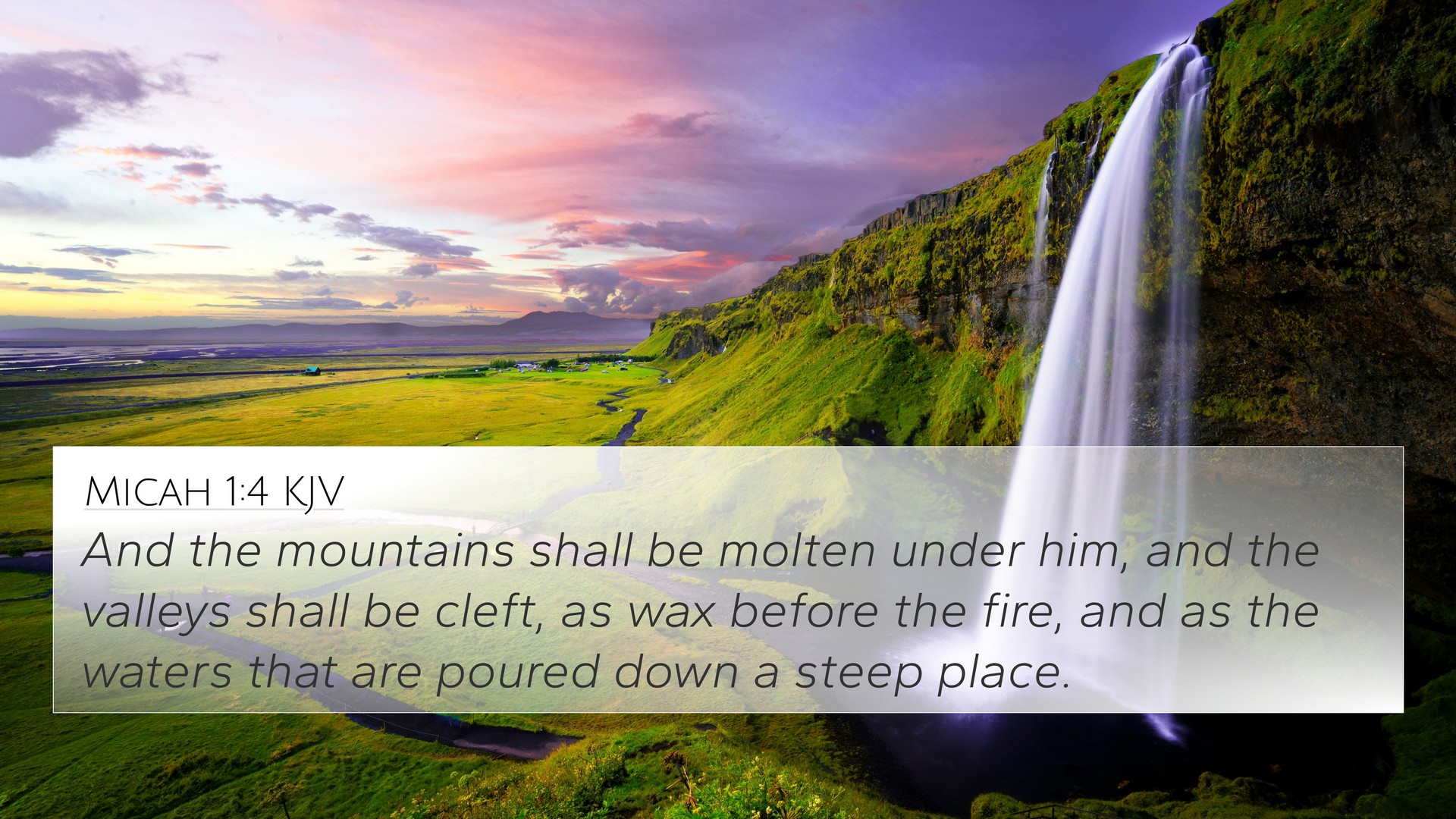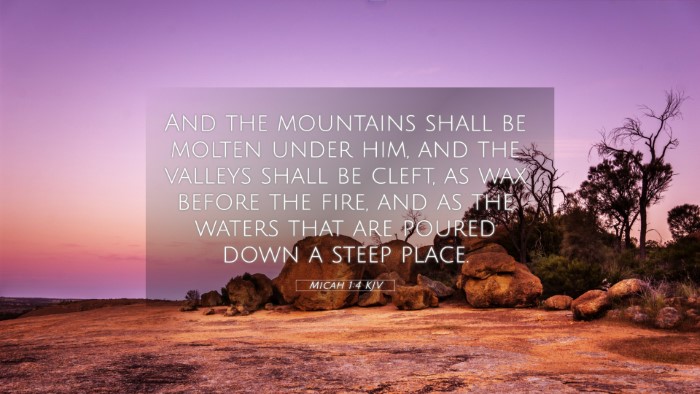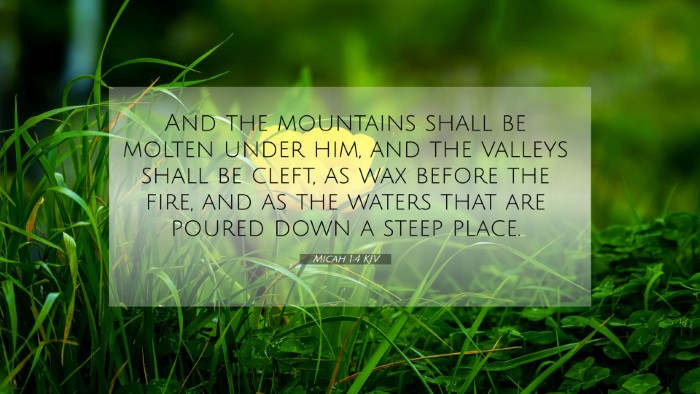Old Testament
Genesis Exodus Leviticus Numbers Deuteronomy Joshua Judges Ruth 1 Samuel 2 Samuel 1 Kings 2 Kings 1 Chronicles 2 Chronicles Ezra Nehemiah Esther Job Psalms Proverbs Ecclesiastes Song of Solomon Isaiah Jeremiah Lamentations Ezekiel Daniel Hosea Joel Amos Obadiah Jonah Micah Nahum Habakkuk Zephaniah Haggai Zechariah MalachiMicah 1:4 Similar Verses
Micah 1:4 Cross References
And the mountains shall be molten under him, and the valleys shall be cleft, as wax before the fire, and as the waters that are poured down a steep place.
Uncover the Rich Themes and Topics of This Bible Verse
Listed below are the Bible themes associated with Micah 1:4. We invite you to explore each theme to gain deeper insights into the Scriptures.
Micah 1:4 Cross Reference Verses
This section features a detailed cross-reference designed to enrich your understanding of the Scriptures. Below, you will find carefully selected verses that echo the themes and teachings related to Micah 1:4 KJV. Click on any image to explore detailed analyses of related Bible verses and uncover deeper theological insights.
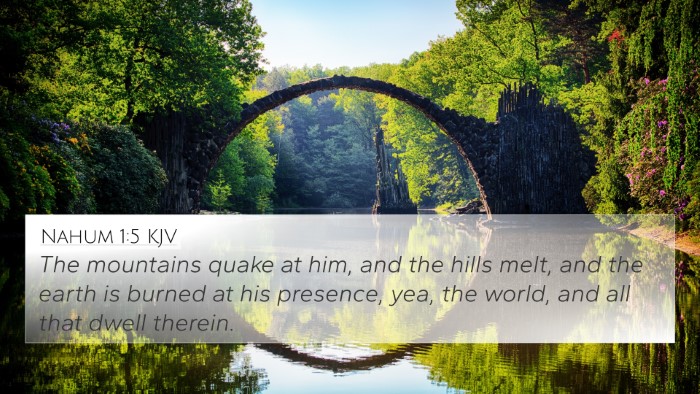
Nahum 1:5 (KJV) »
The mountains quake at him, and the hills melt, and the earth is burned at his presence, yea, the world, and all that dwell therein.
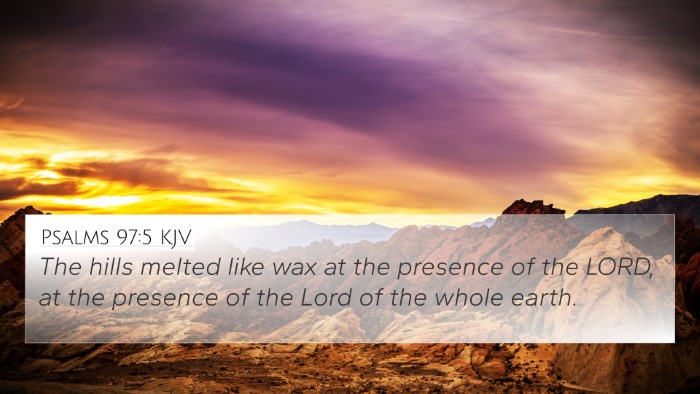
Psalms 97:5 (KJV) »
The hills melted like wax at the presence of the LORD, at the presence of the Lord of the whole earth.
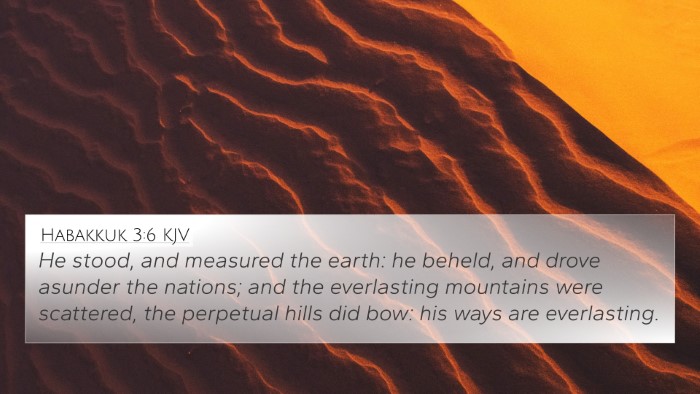
Habakkuk 3:6 (KJV) »
He stood, and measured the earth: he beheld, and drove asunder the nations; and the everlasting mountains were scattered, the perpetual hills did bow: his ways are everlasting.
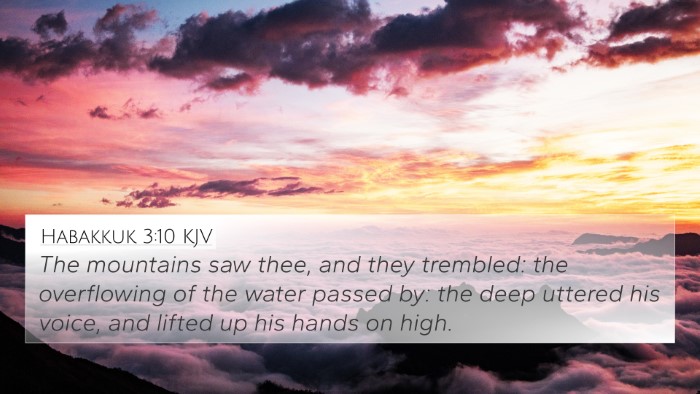
Habakkuk 3:10 (KJV) »
The mountains saw thee, and they trembled: the overflowing of the water passed by: the deep uttered his voice, and lifted up his hands on high.
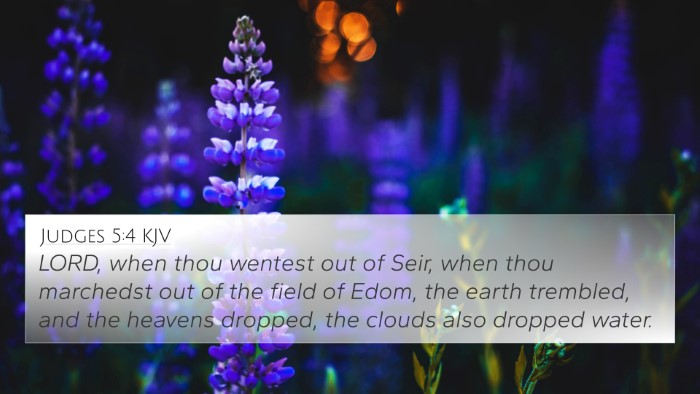
Judges 5:4 (KJV) »
LORD, when thou wentest out of Seir, when thou marchedst out of the field of Edom, the earth trembled, and the heavens dropped, the clouds also dropped water.
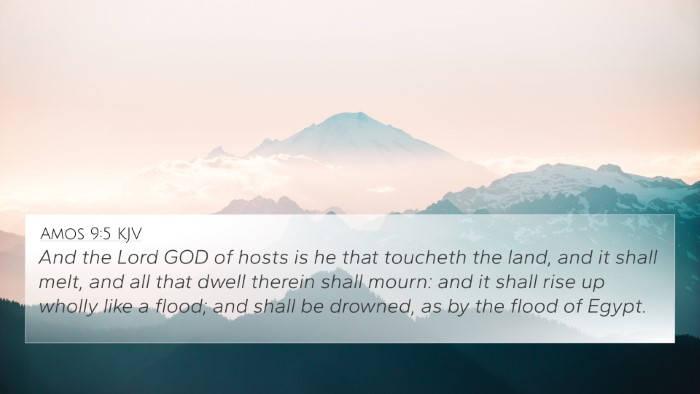
Amos 9:5 (KJV) »
And the Lord GOD of hosts is he that toucheth the land, and it shall melt, and all that dwell therein shall mourn: and it shall rise up wholly like a flood; and shall be drowned, as by the flood of Egypt.
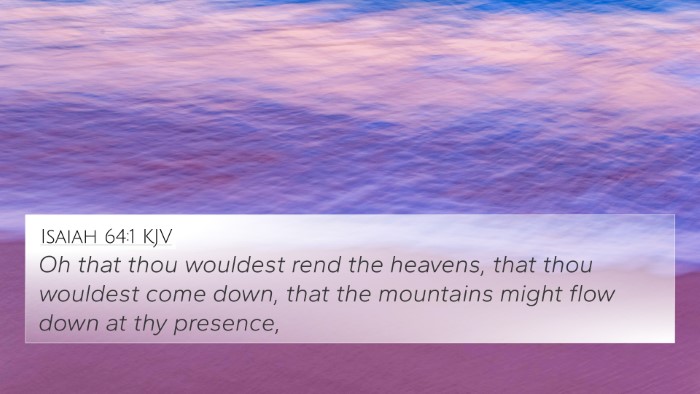
Isaiah 64:1 (KJV) »
Oh that thou wouldest rend the heavens, that thou wouldest come down, that the mountains might flow down at thy presence,
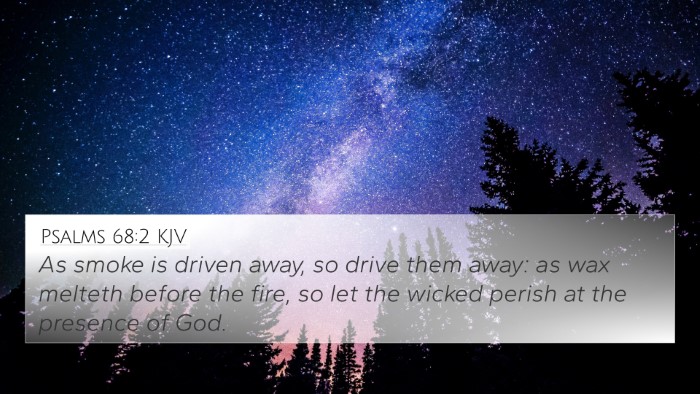
Psalms 68:2 (KJV) »
As smoke is driven away, so drive them away: as wax melteth before the fire, so let the wicked perish at the presence of God.
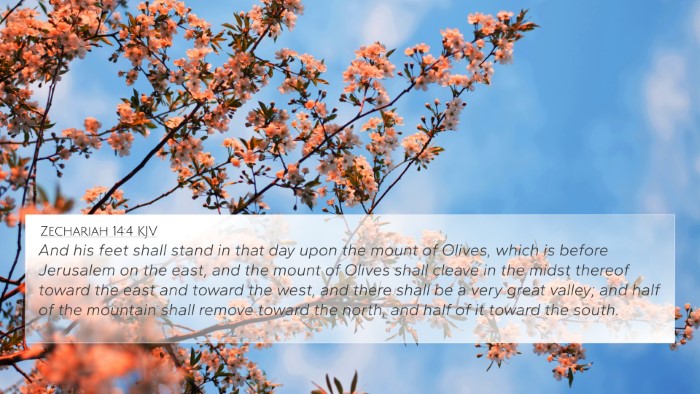
Zechariah 14:4 (KJV) »
And his feet shall stand in that day upon the mount of Olives, which is before Jerusalem on the east, and the mount of Olives shall cleave in the midst thereof toward the east and toward the west, and there shall be a very great valley; and half of the mountain shall remove toward the north, and half of it toward the south.

2 Peter 3:10 (KJV) »
But the day of the Lord will come as a thief in the night; in the which the heavens shall pass away with a great noise, and the elements shall melt with fervent heat, the earth also and the works that are therein shall be burned up.
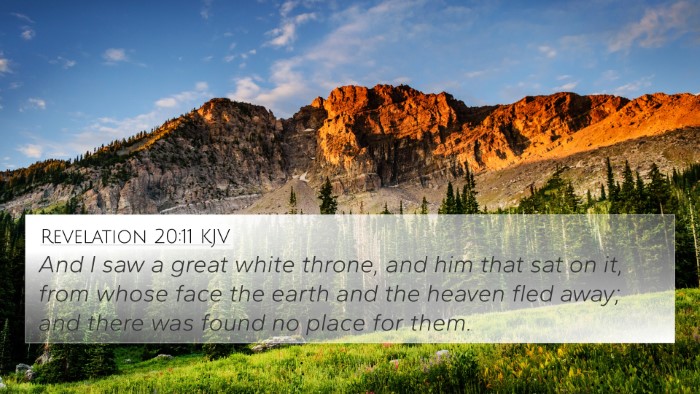
Revelation 20:11 (KJV) »
And I saw a great white throne, and him that sat on it, from whose face the earth and the heaven fled away; and there was found no place for them.
Micah 1:4 Verse Analysis and Similar Verses
Understanding Micah 1:4
Micah 1:4 states, "And the mountains shall be molten under him, and the valleys shall be cleft, as wax before the fire, and as the waters that are poured down a steep place."
This profound verse captures the impending judgment and divine intervention that Micah prophesies. The imagery of melting mountains and cleaving valleys evokes a sense of catastrophic upheaval, symbolizing God's awesome power and authority over creation.
Commentary Insights
Based on insights from public domain commentaries like Matthew Henry, Albert Barnes, and Adam Clarke, we can delve deeper into the meaning of this verse.
-
Matthew Henry's Commentary:
Matthew Henry illustrates that this verse represents the severity of God’s judgment on Israel, portraying a terrible scene where the natural order is disrupted due to the weight of divine justice. The melting of mountains signifies a powerful presence that cannot be resisted, indicative of God's sovereignty and the seriousness of sin.
-
Albert Barnes' Notes:
Barnes highlights the metaphor of mountains and valleys to signify the might of God that can tear through the strongest and the lowest parts of the earth. This indicates that no one—whether high or low—can escape the consequences of divine judgment. The "waters poured down a steep place" evoke a sense of uncontrollable force, reminding readers of the overwhelming nature of God's wrath.
-
Adam Clarke's Commentary:
Clarke points out that the imagery here serves a dual purpose: it warns of impending doom while simultaneously affirming God's ultimate dominion. The reference to "wax before the fire" signifies how temporal and frail human constructs are before the divine. This verse serves as a warning to Judah and Israel about the chaotic results of forsaking God.
Bible Verse Cross-References
Micah 1:4 connects with various other scriptures, illustrating a rich web of biblical interconnections. Below are some relevant cross-references:
- Psalm 97:5: "The hills melted like wax at the presence of the LORD, at the presence of the Lord of the whole earth." - This verse echoes the notion of creation's response to God's presence.
- Isaiah 64:1: "Oh, that You would rend the heavens! That You would come down, that the mountains might shake at Your presence!" - This demonstrates a similar appeal for divine intervention.
- Revelation 6:14: "Then the sky receded as a scroll when it is rolled up, and every mountain and island was moved out of its place." - Here, the apocalyptic imagery mirrors the cosmic disturbances depicted in Micah.
- Jeremiah 10:10: "But the LORD is the true God; He is the living God and the everlasting King. At His wrath, the earth will tremble." - This verse reflects the theme of divine authority and response.
- Nahum 1:5: "The mountains quake before Him, the hills melt, and the earth heaves at His presence, yes, the world and all who dwell in it." - Affirms the theme of nature responding to divine power.
- Romans 8:22: "For we know that the whole creation groans and labors with birth pangs together until now." - Here, creation's turmoil reflects the consequences of human disobedience.
- Matthew 24:29: "Immediately after the tribulation of those days the sun will be darkened, and the moon will not give its light; the stars will fall from heaven, and the powers of the heavens will be shaken." - An eschatological link to the divine upheaval.
Thematic Connections and Analysis
The themes present in Micah 1:4 tie into broader biblical narratives. The discussion of God’s intervention through natural disaster is seen throughout scripture, particularly in prophetic literature.
- Divine Judgment: This verse serves as a reminder of the consequences of turning away from God. Scripture is replete with examples of judgment (e.g., Noah's Flood, Sodom and Gomorrah).
- God’s Sovereignty: The collapse of mountains symbolizes God’s ultimate authority over all creation, linking to verses that reflect His power (e.g., Job 38:4-6).
- Call to Repentance: The vivid imagery serves to awaken the people to return to God before the impending judgment, paralleling calls from other prophets (e.g., Jeremiah 3:12-13).
Conclusion
In summation, Micah 1:4 is a powerful verse that conveys the seriousness of divine judgment while underscoring God's omnipotence. Through a careful examination of this verse and its connections to other scriptures, readers gain a deeper understanding of God's nature and intentions. The implications of such verses are far-reaching, serving as both a warning and an invitation to recognize the need for repentance and alignment with divine will.
